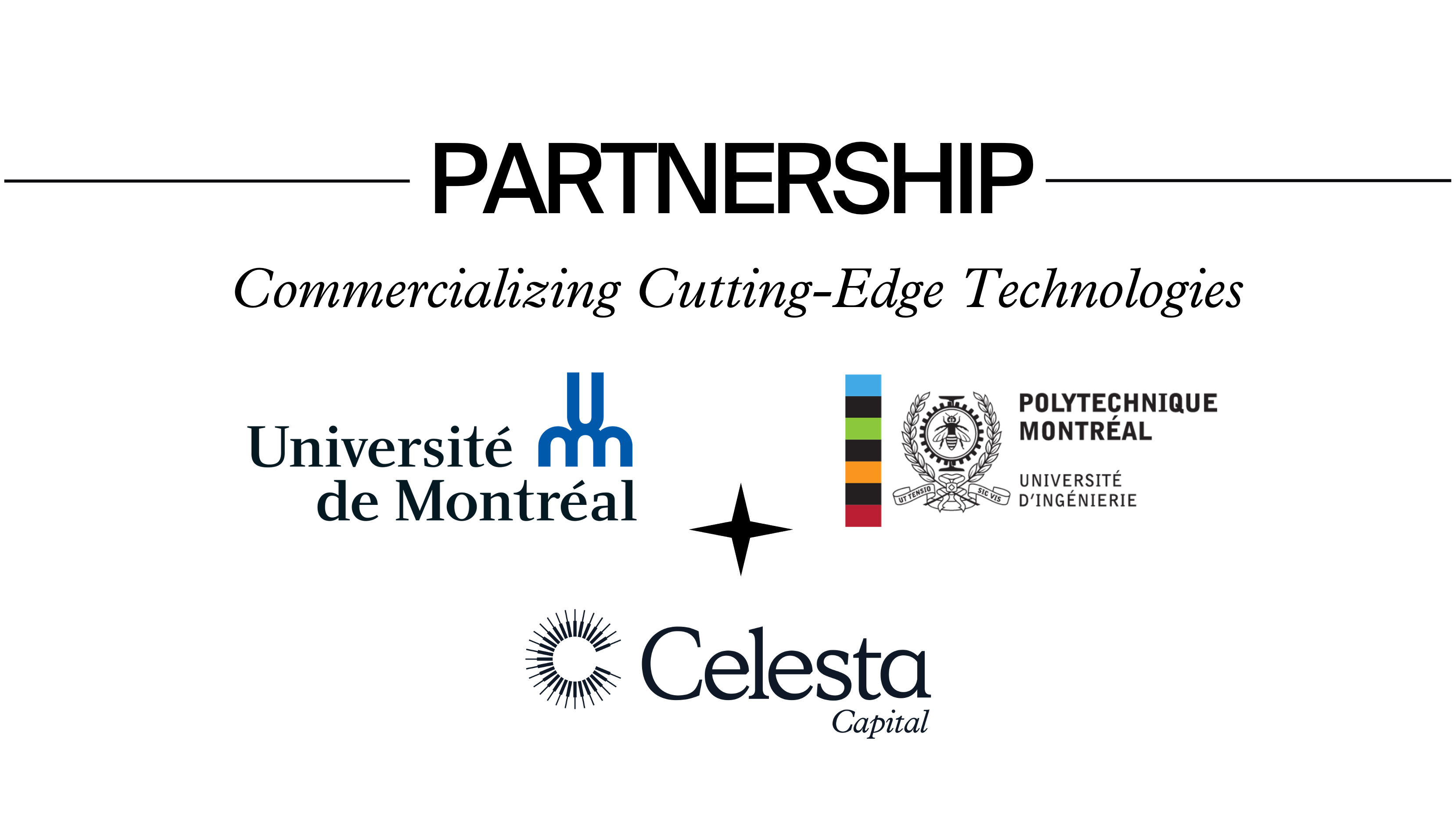Q&A With Celesta Founding Managing Partner Nic Brathwaite
Q&A With Celesta Founding Managing Partner Nic Brathwaite
Celesta Founding Partner Nicholas Brathwaite has spent over 25 years developing technology and building technology-oriented businesses. Before Celesta, Nicholas was also co-founder and partner of private equity firm Riverwood Capital, and from 1996 to 2007, he served as the CTO at Flex, where he oversaw the launch and growth of several of Flex’s largest business units, including an innovative push into product development.

Celesta Founding Partner Nicholas Brathwaite has spent over 25 years developing technology and building technology-oriented businesses. Before Celesta, Nicholas was also co-founder and partner of private equity firm Riverwood Capital, and from 1996 to 2007, he served as the CTO at Flex, where he oversaw the launch and growth of several of Flex’s largest business units, including an innovative push into product development.
Q) What makes you excited about technology investing today?
We believe there has perhaps never been a better time to be investing in deep tech, largely because of the variety and breadth of opportunities. There are so many different new discoveries, advancements, and applications emerging that the opportunities are much greater and broader than we’ve seen in the past.
Our focus sectors range from everything including materials to semiconductors, advanced processing for manufacturing, and industries undergoing significant digital transformation like construction and retail. On top of that, you have areas like AI and machine learning, where generative AI and predictive AI are still in their infancy. Within every one of these core categories or industry verticals, you have many different subcategories and dimensions of investing opportunity.
It’s such a rich time, and I don't believe that's likely to slow down anytime soon.
Q) How does Celesta partner with founders?
We believe that when we invest, the most important ingredient Celesta can bring to the partnership between us and the entrepreneurs is our intellectual capital. Anyone can provide financial capital – what creates real value is intellectual capital. Most of this is provided by the entrepreneurs and their team, but what we bring is the experience and knowledge of what it takes to develop successful products, teams, and businesses.
Success for us is not only investing in the development of interesting or trendy new technologies – we invest in companies because we believe they have the potential to also become sustainable businesses.
Particularly if you're investing in deep tech, you must of course have really good technical expertise to evaluate different technologies. But you also must support the business and operations side with a business model that is appropriate, clear strategies around things like supply chain, product definition, go to market, competitive differentiation, etc.
Every startup company can use help at various stages of their life cycle. We have purposely built a firm where we have people with different skills and expertise who can help these companies at different stages in their life cycle and help them anticipate and prevent some of the common mistakes startups can find themselves confronting.
We have grown substantially as a firm over our first decade investing. Between the caliber of our team and our very strong track record of investment returns, we feel Celesta is second to none as deep tech investors.
Q) What do you see as the common challenges faced by tech startups?
There are several potential challenges founders must plan for. Building a company is not an easy undertaking.
Within the deep tech space, you must first have a sound technology strategy and a plan for strong differentiation. But you also need to build the right team, product strategy, go-to-market strategy, and broader business plan necessary to support your growth. Then you must be able to objectively evaluate and respond to your strengths, weaknesses, and gaps as you see results and the market continues to fluctuate around you.
The strongest founders are those who realize they will only get better and go further by accepting help and advice. You will always find challenges and there will always be weaknesses in some aspect of a startup. If the founding team understands that there are some areas where they need support and they're willing to listen, you have a much better chance of overcoming any issues.
We believe that when we invest, the most important ingredient that Celesta can bring to the partnership between us and the entrepreneurs is our intellectual capital. Anyone can provide financial capital – what we bring is the experience and knowledge of what it takes to develop successful products, teams, and businesses.
Q) How has Celesta’s investment thesis evolved over time?
While our investments of course evolve as technology cycles progress, our thesis has remained consistent from the beginning. There are three primary investment themes we pursue today.
The first is the development of platforms that enable broader adoption of emerging technologies. We believe that many of the great technological innovations are built upon advancements in semiconductors and hardware. We invest in some software also, along with platforms that combine hardware and software. But at their core, the emerging technologies we invest in are those we believe are essential for creating the inflection point between early adoption and mass adoption. Examples of this include the underlying systems innovations necessary to bring markets like electric vehicles and cloud computing to scale.
Second, we invest in technologies that we believe are necessary to transform large existing industries like construction, agriculture, education, and others. We believe that without transformation they will not meet the demands of the current global population. Here we invest in companies disrupting the status quo by introducing more mature technologies at scale.
Lastly, we are extremely interested in the intersection of biotech and high tech, which we call bioconvergence. This is an area in which advancements in high tech are being newly adopted by the biotech industry. We think this will drive an increase in the pace of healthcare innovation, for example reducing the amount of time it takes for drug discovery and the creation of superior diagnostics tools.
Q) What are some of Celesta’s past or current investments you’re most excited about?
Berkeley Lights was a fantastic exit for Celesta and our investors. Berkeley was one of our earliest bioconvergence investments, specializing in development of digital cell biology platforms for accelerated discovery, development, and delivery of cell-based products and therapies. The company went public in 2020 and went on to play a big role in cell discovery that helped accelerate the creation of COVID vaccines.
Another company I'm extremely excited about is ideaForge, one of our early investments in India. ideaForge is a developer of drone aerial robotics focused on the security and enterprise markets in India. I had the honor and the pleasure of serving on their board for almost six years. Along with other colleagues at Celesta, we worked very closely with them to help their team develop and build a business that now owns more than 80% of India’s commercial drone market. They recently completed a successful IPO earlier this year.
Q) Can you share a bit about your road to venture investing?
I was born in the Caribbean on an island called Grenada. Education was always a big focus of our family. When I was around 14, my dad became a diplomat with the British Commonwealth Secretariat and we moved to Guyana, where my dad had taken up a leadership role focused on youth education. After finishing high school in Guyana and Barbados, I moved to Canada to pursue my undergraduate degree at McMaster University, followed by graduate studies at the University of Waterloo.
I started my career at Intel Corporation as a process engineer. Initially, I worked in the manufacturing side in one of Intel's factories and after two years I moved into technology development. I credit that with a big reason for the collaborative approach I have to technology development because I got to see both sides of technology development and its production, and the need for those to be closely in sync. So, when I went into technology development, I took a very collaborative approach to design products for manufacturing.
After Intel, I left to join as a founding team member at nChip, which was a venture-backed semiconductor company supported by Kleiner Perkins, Mayfield, and others. The company was acquired by Flextronics.
That's when I met Michael Marks, Flextronics’ CEO who became my longtime business partner. Michael asked me to become the CTO of Flextronics and I became responsible for both process development and product development. I started many businesses for Flex, including their ODM, components, and design services businesses. I am incredibly proud of the role I was able to play a role at Flex, helping to take a company that was almost bankrupt and turning it into one of the leaders in the segment of the industry, and in that process, employing over 300,000 people.
Following a great run at Flex, I left and joined Michael in starting what became known as Riverwood Capital, a growth stage private equity firm. Right around that time, I also was running a company called Aptina, which was a spin out from Micron and was the largest provider of CMOS sensors. I was chairman and CEO for three years before we sold it to ON Semiconductor.
After several years at Riverwood, Michael and I were interested to transition into more early stage venture investing, which was the genesis of what has grown into Celesta.
Q) You have broad experience as an executive and investor – what drives you in this role as General Partner at Celesta?
Being able to work with entrepreneurs and founders on their ideas and see them turn into meaningful businesses – that is hugely satisfying to me. It's one of the reasons I chose the venture side over growth equity, because I like being involved in the early discussions around ideas and concepts, watching those ideas turn into products, and then to see those products drive business growth. Participating in the development of pioneering technology and products is something I continue to be excited about.
I also like being involved in helping to mentor people and to play a part in their development. I get involved a lot in our companies because I like being a mentor to entrepreneurs and helping them to think about what it takes to build a business.






